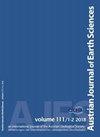华甸盆地始新统细粒碎屑岩的矿物学地球化学特征:对沉积物物源、古气候和沉积环境的指示意义
IF 1.1
4区 地球科学
Q2 Earth and Planetary Sciences
引用次数: 5
摘要
华甸盆地是中国东北地区一个小型断控盆地。始新统华甸组发育厚湖相油页岩和含煤沉积。采集了油页岩、泥岩和碳质页岩样品,确定了它们的矿物学和地球化学(主要元素、微量元素和稀土元素)特征。这些资料用于评价沉积物物源以及古气候和沉积环境。华甸组细粒沉积物主要由长英质火山岩和花岗岩组成,并夹杂少量基性岩和沉积岩。地球化学指标证实了源区沉积物的再循环。黏土矿物学和化学蚀变指标表明,细粒沉积物沉积时期为亚热带温暖湿润气候。华甸组沉积时期的气候变化,从稳定的暖湿气候引起中度化学风化(黄铁矿段),到季节性干湿气候(油页岩段),再到稳定的暖湿气候引起强烈化学风化(碳质页岩段)。无机指标表明,华甸组细粒沉积物形成于缺氧淡水环境。只有油页岩段的沉积物反映了淡水和微咸环境的波动。始新世气候变化控制着湖泊水位变化和水化学。微咸、严格缺氧的环境和温暖湿润的气候有利于优质油页岩的形成,而淡水条件和温暖湿润的气候有利于泥炭的富集。本文章由计算机程序翻译,如有差异,请以英文原文为准。
Mineralogy and geochemistry of fine-grained clastic rocks in the Eocene Huadian Basin (NE China): Implications for sediment provenance, paleoclimate and depositional environment
The Huadian Basin is a small fault-controlled basin in northeast China. It is filled by the Eocene Huadian Formation comprising thick lacustrine oil shale-and coal-bearing sediments. Oil shale, mudstone and carbonaceous shale samples have been collected to determine their mineralogical and geochemical (major, trace and rare earth elements) characteristics. These data are used to evaluate sediment provenance as well as paleoclimate and depositional environment. The fine-grained sediments in the Huadian Formation are derived from felsic volcanic rocks and granites, mixed with minor amounts of mafic and sedimentary rocks. Geo-chemical proxies confirm sediment recycling in the source region. Clay mineralogy and indices of chemical alteration suggest that a subtropical warm and humid climate prevailed during deposition of the fine-grained sediments. The data also suggest climatic changes during deposition of the Huadian Formation, from a stable warm and humid climate causing intermediate chemical weathering (Pyrite Member), to a seasonal dry-wet climate (Oil Shale Member), to a stable warmer and more humid climate causing strong chemical weathering (Carbonaceous Shale Member). Based on inorganic proxies, the fine-grained sediments in the Huadian Formation have been deposited in an anoxic fresh-water environment. Only the sediments of the Oil Shale Member reflect fluctuating freshwater and brackish conditions. The Eocene climatic change controlled lake level variations and water chemistry. A brackish and strictly anoxic environment together with a warm and humid climate was beneficial for the formation of high quality oil shale, whereas fresh-water conditions and warm and more humid climate favored peat accumulation.
求助全文
通过发布文献求助,成功后即可免费获取论文全文。
去求助
来源期刊

Austrian Journal of Earth Sciences
Earth and Planetary Sciences-Paleontology
CiteScore
3.10
自引率
0.00%
发文量
0
审稿时长
>12 weeks
期刊介绍:
AUSTRIAN JOURNAL OF EARTH SCIENCES is the official journal of the Austrian Geological, Mineralogical and Palaeontological Societies, hosted by a country that is famous for its spectacular mountains that are the birthplace for many geological and mineralogical concepts in modern Earth science.
AUSTRIAN JOURNAL OF EARTH SCIENCE focuses on all aspects relevant to the geosciences of the Alps, Bohemian Massif and surrounding areas. Contributions on other regions are welcome if they embed their findings into a conceptual framework that relates the contribution to Alpine-type orogens and Alpine regions in general, and are thus relevant to an international audience. Contributions are subject to peer review and editorial control according to SCI guidelines to ensure that the required standard of scientific excellence is maintained.
 求助内容:
求助内容: 应助结果提醒方式:
应助结果提醒方式:


